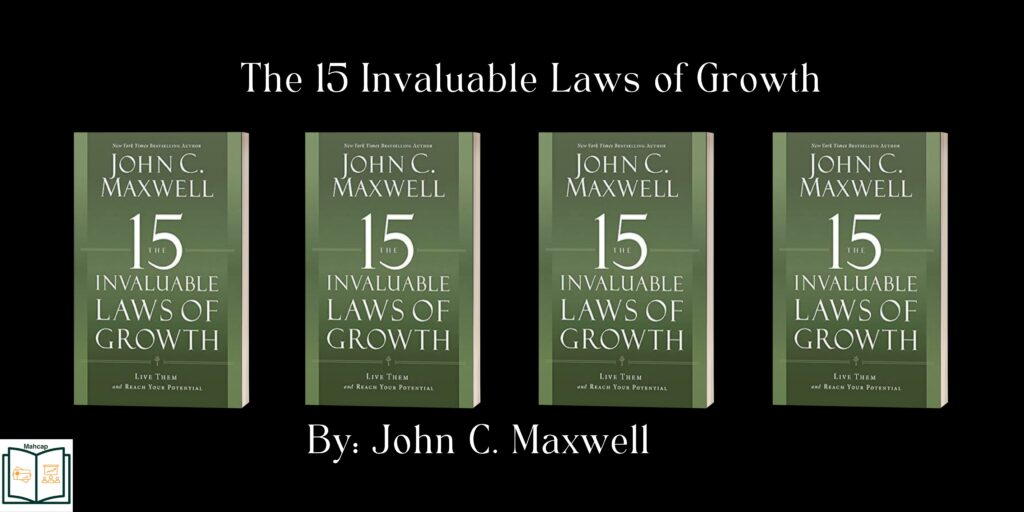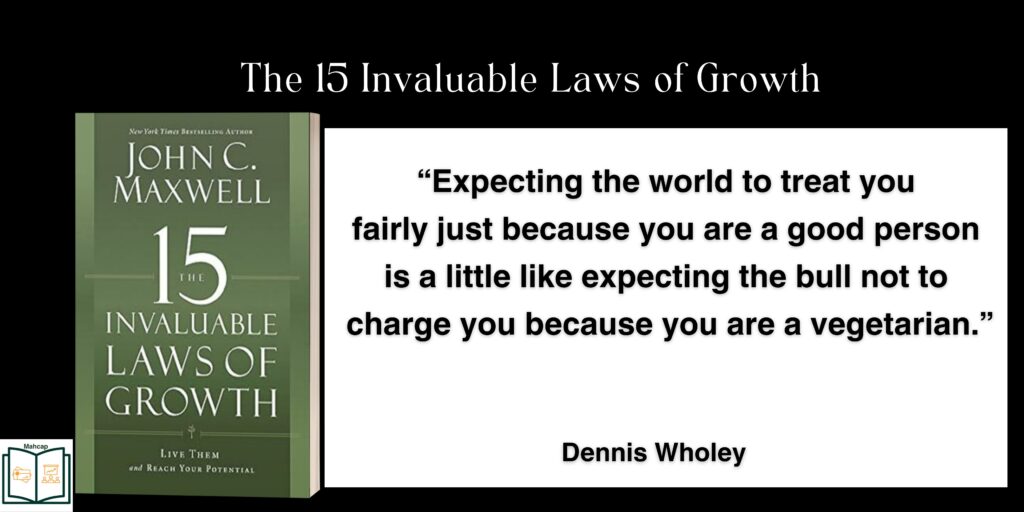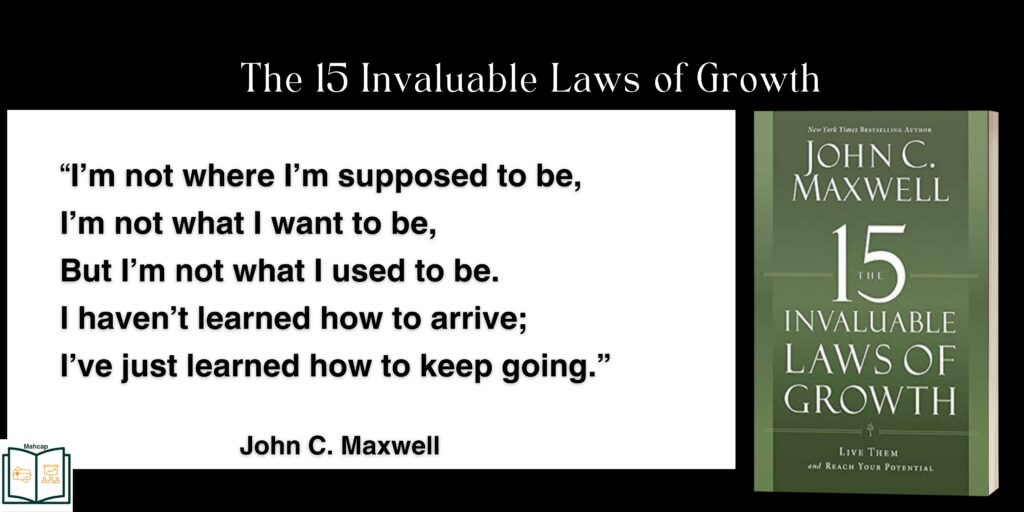The 15 Invaluable Laws of Growth
The 15 Invaluable Laws of Growth by John C. Maxwell is one of the books I enjoyed reading. I learned a lot from the book. I shared it on a Facebook post ending last year but cannot resist sharing it with Mahcap’s beloved blog post readers and subscribers. I have always thought that if you find something invaluable capable of changing your life, share it for others to benefit. Therefore, I would like to share some of the lessons I learned.

Lessons Learned
I have learned 10 lessons from the book, which include1.
Lesson 1: Time Management
The book emphasized time management. It stated,
“How you spend your time is more important than how you spend your money. Money mistakes can be corrected, but once time passed, it is gone forever”.
Time is what life is made of, and everything we do requires time. Therefore, how we use our time is more crucial. This is because while money mistakes can be corrected, time, once lost, is irretrievable. You can lose every penny to your name today and become a billionaire within a year or decade. However, lost time is gone forever. Hence, we must learn not to take time for granted.
Lesson 2: You Are Your Daily Routine
The book stresses that the secret to success lies in our daily routine. This is because our daily routine or activities highlight our reliability, priority, and the relevance of the things we do to our goals and dreams. Who you are or will become is a sum of your daily activities or routine. Therefore, you must change what you do daily to change your life. Life transformation occurs when you change something in your daily habits because success demands consistency built through daily practices.
Lesson 3: Realistic Expectations
This session precedes with two quotes:
Dennis Wholey: “Expecting the world to treat you fairly just because you are a good person is a little like expecting the bull not to charge you because you are a vegetarian.”
Warren G. Lester: “Success in life comes not from holding a good hand but in playing a poor hand well. When we have bad experiences, do we become better or bitter? Will those experiences limit us or lead us to grow?”
This implies that we need to have realistic expectations regarding pain and problems. I was reminded not to expect the world to treat me fairly because I’m a good person. As a good person, you will encounter people who will take advantage of your goodness and sincerity. They are going to make you question yourself repeatedly for being good. However, I have learned that if being good is your identity, do not let anyone or any experience change you into something you are not. Learn from your bad experiences and move forward with determination and consistency.

Lesson 4: Choosing a Positive Life Stance
“Life stance” is a term used to describe your frame of reference- the set of attitudes, assumptions, and expectations you hold about yourselves, other people, and the world in general. It comprises your attitudes towards money, assumptions about your health, and expectations about your children’s future. Therefore, your life stance is how you generally look at things: whether you are optimistic or pessimistic, cheerful or gloomy, trusting or suspicious, friendly or reserved, brave or timid, generous or stingy, giving or selfish. If you can maintain a positive life stance, you put yourself in a position to manage bad experiences and turn them into positive growth.
Lesson 5: Embracing Challenges
For those who always quit upon the first challenge or roadblock, I would like to leave you with a quote:
A bend in the road is not the end of the road unless you fail to make the turn.
As a driver, you will realize that sometimes the road is fairly level and wide; other times, it is hilly, narrow, and has many bends and potholes. Whether you drive home safely depends on your concentration and ability to navigate different circumstances on the road. Therefore, you are the driver of your life; your success depends on your ability to navigate challenges with persistence and focus. Thus, do not worry about the pain you must endure to achieve your goals.
As Diana Nyad said: “I am willing to put myself through anything: temporary pain or discomfort means nothing to me as long as I can see that the experience will take me to a new level. I am interested in the unknown, and the only path to the unknown is through breaking barriers, an often painful process.”
Beverly Sills also stated, “There are no shortcuts to any place worth going. Instant gratification and personal growth are incompatible.
Therefore, if you want the life of your dreams, you must have self-control and discipline to go through the painful process of failure, disappointment, betrayal, disrespect, and loss.
Lesson 6: Inner Self or Inner Being
I want to start this session with some questions. Are you at peace with yourself? Are you genuinely happy for others? Do you pretend to like those you hate to death? Do you feel that everything good must only come to you or be the first to succeed among your friends? Whatever your answers are, I want to remind you that expressing care on the outside with a heart of hatred or contempt on the inside will not bring you lasting peace—continual growth and lasting success result from aligning the inside and the outside of our lives. If you want to be successful, you must prioritize building your inside ahead of your outside. Also, whatever belongs to you will surely be yours if you work for it. So be happy for others, and wish them well sincerely.
Lesson 7: Pushing One’s Limit for Growth
We are all familiar with the many uses of a rubber band. However, regardless of what they are used for, rubber bands are useful only when they are stretched. That can also be said about us. Therefore, to maximize your God-given potential, which, according to studies, we use only 10 percent, you must be willing to stretch yourself to open the door of opportunities. You must be willing to take calculated risks. People who take risks learn more and faster than those who don’t. Their depth and range of experience are often greater. And they learn how to solve problems. Sometimes, we are our own limitations because of familiarity with comfort and fear of the unknown. However, if you don’t take the first staircase, you will not know what awaits you. If you don’t open the door, you will not find whether the room is full of gold or rubber.
Lesson 8: The Law of Trade-Offs
I have experienced the law of trade-offs but never really appreciated the concept till I read the 15 laws of growth by John C. Maxwell. From the book, I learned that you have to give up to grow up. The question is, Are you willing to let go of the things that you love and value most to grow?
Suppose you have a good salary, job, home, community, and level of security. Are you willing to give up those things for a chance to do something that will take you closer to your potential? That is how the law of trade-offs works. You have to give up somethings you value to grow your potential. But to successfully do this, you must ask the right questions. Ask yourself whether the sacrifice and decision will take you closer to your dream.
Do not ask yourself wrong questions like, “How hard will the new job or adventure be? What will my friends think of me? What will I do if this new job or adventure does not work out as planned? Make the decision and dove in with everything in you.

Lesson 9: Being Better
I found these words inspiring and want to share them with you because I love Mahcap readers and audiences so much. Whether you are at the start, middle, or end of your career journey, personal growth is something that never stops. Therefore, reminding oneself of these words can help inspire growth.
I’m not where I’m supposed to be,
I’m not what I want to be,
But I’m not what I used to be.
I haven’t learned how to arrive;
I’ve just learned how to keep going.
Lesson 10: Life Questions
I am leaving you with a few questions to think about.
- If you knew you could not fail, what would you attempt?
- If you had no limitations, what would you like to do?
- If finances were not an issue, what would you be doing?
I conclude by sharing John’s wisdom that whatever you do, remember to be tender with the young, compassionate with the aged, sympathetic with the striving, and tolerant of the weak and strong. Someday in life, you will have been all of these.
By: Huzeima Mahamadu
For more updates and insights about books, subscribe to Mahcap!
Reference
- Maxwell, J. C. (2012). The 15 Invaluable Laws of Growth. ↩︎
